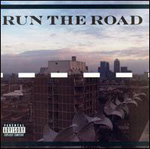
Various Artists
Run the Road Comp
(Vice; 2005)
By Peter Hepburn | 13 April 2005
Vice Records is cooler than you. It’s not something to lose sleep over, really, but more one of those realities you must come to accept. You didn’t stand much of a chance, and lets face it, it’s hard to be cooler than Vice. Luckily, they’re willing to share the wealth. So everybody take Silent Alarm off repeat for a few minutes and lets take a look at Vice’s latest public service project: Run the Road, an introduction to the world of grime.
Now, for the purposes of full disclosure, I am in need of an introduction to grime as much as anyone. Sure, I have the Dizzee and Streets albums (and was one of the people who liked these record—probably disproportionately to the quality), but I wouldn’t last five minutes if people started questioning my knowledge of the London music scene.
Coming from this basic ignorance, several points emerge in dealing with Run the Road:
1. Grime really does fit into a historical framework of British music as well as reflecting American hip-hop and club influences. The delivery style is certainly not traditional rapping, though there are a number of MCs, most notably Wiley and Durrty Goodz, who do flow impressively. The reference points seem more related to the British reggae movement (see “Cock Back V1.2”) and club-moving rants (“Unorthodox Daughter,” “Cha Ching”).
2. Either grime is a tiny little inbred scene or Vice really didn’t try that hard to find slept-on artists. There are six artists who appear on two or more tracks, Kano leading the pack with five appearances over the 16 tracks on the comp.
3. Grime is perfect for America. No really, I’m serious. I can’t think of another musical genre that is better suited for the current musical scene. A lot of the songs on Run the Road are desperate emo-rap, and if there’s one thing that white suburban kids can’t get enough of, it’s emo-rap. Slug can’t keep the market going all by himself, the whole Anticon scene is too weird for most, and there are few emo-rappers that match their venting with such vicious, raw beats. Remember Dizzee Rascal’s “Do It” (“sometimes I wake up / wishing I could sleep forever”)? Listen to Shystie’s “One Wish” and you’re confronted with a refrain of, “you don’t know where I’ve been / you don’t know what I’ve been through / so how can you judge me?” I mean come on, what teenager out there can’t associate with that, even if Shystie is rapping about the slums of South London and not problems with parents? The (relative) success of The Streets and Dizzee Rascal in the U.S. shows that American audiences are occasionally open to music that doesn’t sound exactly the same.
Run the Road shows some of the flaws of the genre too. While there are plenty of clever and charismatic MCs, a few duds are thrown in as well. Wiley’s section of “Destruction VIP” falls flat; Rascal’s track is uncharacteristically weak; and Demon’s “I Won’t Change” is just embarrassing, matched only by Ears’s middling “Happy Dayz.”
Still, for each of these, there seem to be a few blazers. Kano is relatively consistent throughout, at his best on solo track “P’s & Q’s.” The evil synth beat of No Lay’s “Unorthodox Daughter” matches well to her fast, nasal, and vicious delivery. The two tracks that really bring it, however, are Lady Sovereign’s club-banging “Cha Ching” and the remix of The Streets’s “Fit But You Know It.” “Cha Ching” rides a simple yet effective groove under Sovereign’s clever lines, leaving her plenty of room to throw down a gibberish hook. I actually wasn’t that fond of the original “Fit But You Know It,” but the remix lets a few real MCs have their way with a strong beat, and all of them are funny enough to make it work, especially when Lady Sovereign takes the other side and drops the rapid-fire:“I don’t think I’m nice / I know I’m nice / ‘cause your eyes / looked twice / up-down / left-right / left-right / left-right.”
The questions about the viability and future of grime seem like one of the more important debates in the rap world these days. Are these artists really rapping? They certainly reflect the basic ideas of story telling and braggadocio that have defined hip-hop culture in the U.S. There’s also a raw, hungry desire to succeed evident in the majority of these tracks that seems to have been lacking from much of American rap recently, and it’s refreshing. Time will tell whether the movement can really catch on in the U.S., but it seems like the combination of that drive and the inherently emo qualities of so much of this music (hard as it may seem on first listen) could facilitate this jump across the pond. If nothing else, it would certainly make popular music more interesting.





